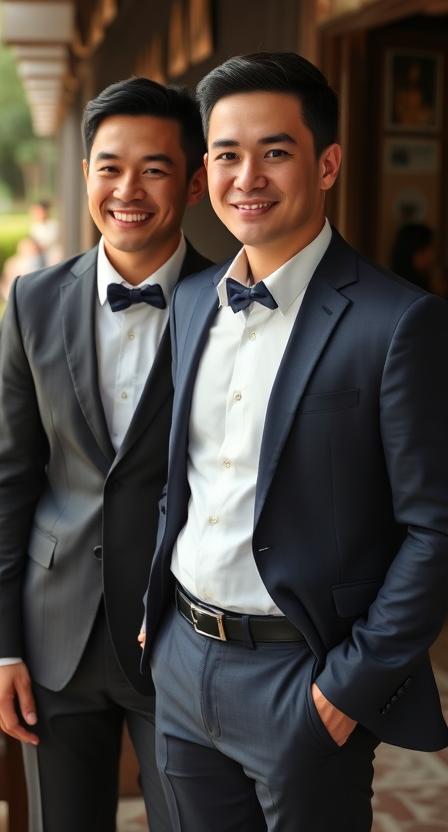- About Us
- Legal Services
- Family Law
- Property
- Marriage
- Immigration
- Contact
- Payments
Same sex marriage in Thailand is now legal. As we know that the Thailand is one of the most welcoming destinations in Asia for LGBT!+ travelers. Many have viewed Thailand as a “gay paradise” due to its vibrant nightlife with a very diverse entertainment scene. Gay tourists love Pattaya, Bangkok and Phuket. With Thailand’s glossy image this often masks the social and legal issues in Thailand when it comes to gay rights. In this article we will also look at the so-called “Pink Economy”, and unpacks the marriage and wedding landscape for LGBT+ couples in Thailand. Lastly also see the articles we wrote on gay marriage prenuptials as well as the gay marriage Australia visa.

With Thailand booming tourism sector Thailand is viewed as a gay-friendly country. There is of course the famous nightlife scene as well as other cultural attractions. Much like Pattaya and Bangkok are often described as LGBT+ havens. This as these tourist attractions include an abundance of gay bars, drag shows, saunas, and the annual pride events. Many travel agencies in Thailand frequently promote Thailand as an ideal spot for gay couples.
Looking at the outside world it all looks perfect. This mainly in these tourist areas. The country in reality does not yet have comprehensive anti-discrimination laws. You can see the case of Accord Hotels in Thailand and how that ended up a few years ago. Same sex is legalized today in Thailand as well as adoption rights. The one holdup that it still has is equality where they can change their gender on their Thai ID card.
This disparity between international image and domestic reality reveals a disconcerting truth. One could make the argument that in Thailand LGBTQ rights is more decorative that a reality. That being said, in conservative Asia Thailand has proven to be miles ahead in Asia when it comes o LGBTQ rights. See also the article that we wrote on LGBTQ in the Media as well.
As of 2025, Thailand has now legalize same-sex marriage. There is now such tings as as joint property ownership and which you will need to look at a prenuptial agreement for same sex marriage. There is now also inheritance rights. The proposed amendments to the Civil and Commercial Code. This to redefine marriage as a union between “two persons” instead of “a man and a woman” was passed in early 2025.
Currently, same sex couples and heterosexual couples can legally marry in Thailand. The marriage registration process for Thai nationals will involve the following:
1. Submitting your Thai identification documents (national ID card and house registration).
2. Applying for a marriage license at a local district office (amphoe office).
3. Likewise signing the marriage register in the presence of an officer.
Ceremonial weddings are not binding marriages. Likewise the traditional marriage is rich in Thai cultural traditions, may precede or follow legal registration. For same-sex couples, however, these weddings likewise will remain symbolic until the marriage is registered.
Foreigners or expats can marry in Thailand, including one foreigner with a Thai national. The process includes:
1. Obtaining an Affirmation of Freedom to Marry from the foreigner’s embassy.
2. Translating and legalizing the document at the Ministry of Foreign Affairs.
3. Registering the marriage at a district office with proper identification.
For same-sex couples, embassies from countries where same-sex marriage is legal may issue Affirmations of Freedom to Marry. You will note that Thai authorities do allow registration of these marriages. As a result, foreign gay couples often marry in symbolic ceremonies and then register their marriage.
Thailand is a top destination for symbolic same-sex weddings, offering breathtaking locales and inclusive services:
· Bangkok: This is a cosmopolitan hub with luxury hotels and rooftop venues catering to LGBT+ weddings.
· Chiang Mai: Well known for its cultural heritage and natural beauty.
· Pattaya: With its reputation as an LGBT+ hub, Pattaya offers vibrant beachside venues.
· Phuket and Krabi: These southern beach destinations are ideal for sunset ceremonies.
· Koh Samui and Koh Phangan: Known for their laid-back atmosphere and picturesque beaches.
LGBTQ+ wedding planners and travel agencies have sprung up across Thailand to cater to this growing market. Many venues also offer Buddhist-style blessings, performed by open-minded monks or in spiritual ceremonies designed to reflect Thai traditions without violating monastic codes.

Full consultation about the process and requirements for getting married in Thailand
Translation of the Affirmation statement into Thai. Legalization of the translated documents at the local Ministry of Foreign Affairs
Preparation of the wedding papers and registration of the marriage at the local Amphur office.
Translation of the marriage certificates into English and legalization of the translated certificates for your home country. We then forward this to you.
I just wanted to extend our heartfelt thanks to all the staff at G.A.M Legal Alliance for your invaluable assistance and guidance during our marriage registration. We are delighted to share that we have now received our marriage certificates and are currently in the process of applying for a UK partner visa.
As as aside. We were one of the first same sex couple who got married in Thailand, I want to thank you for your support and professionalism. Thank you again for all the help.
We want to sincerely thank everyone at G.A.M Legal Alliance for making our wedding registration process smooth and straightforward. Navigating official paperwork isn’t usually my thing, but your professionalism and support made it effortless.
As a same-sex couple, it meant a lot to feel respected and well taken care of. We’re truly grateful and will happily recommend your services to our friends. Be well, and thank you again for everything!
Talking about the “Pink Economy” and you will understand how gay rights affects the economy. How gay rights affects the economy is enormous. Thailand ranks as a top LGBTQ+ destination. In 2019 even TAT the Tourist Authority of Thailand launched a campaign tarting LGBTQ+ travelers. It is estimated that the LGBTQ+ travel market is worth about US 200 Billion, with Thailand taking one of the largest shares of that market.
Outside of the tourist sector. The gay community have also developed their own businesses. This ranges from fashion, cosmetics and entertainment and the media. There are also major annual gay festivals which range from the Bangkok Pride and Phuket Pride events. There are also a few well known advertising agencies in Thailand all the way to salons.
Note that even with economic significance it has not translated into sustained political representation or legal equity. There are very few openly LGBT+ politicians have been elected to office. There have been delays in a number of laws that have been delayed. The Thai government’s embrace of the Pink Economy without full recognition of LGBT+ rights has led some activists to accuse it of “rainbow-washing”—using LGBT+ imagery for marketing while ignoring demands for systemic reform.
We have an article on gay rights and religion on this website. You can find it under Religion and LGBTQ as an article. For those who have been to Thailand, you will know that Thai society has historically exhibited a “live and let live” attitude toward diverse sexual and gender identities. Likewise Buddhism does not have a strict doctrine condemning homosexuality. Hence Thai people often adopt a relatively accepting approach, especially in urban areas.
You will also note that the term kathoey, referring to transgender women or effeminate gay men, has been part of Thai vocabulary and culture for centuries. So in a conservative society tolerance exists for those people who are gay. Much like we mentioned before this tolerance does not normally go well in rural areas. One could say that at best tolerance often exists in parallel with conservative social expectations.
Anti-Discrimination and Workplace Rights
When it comes to workplace discrimination. This mainly occurs outside of Bangkok. This remains a major issue especially when the person is gender non-conforming. They will face issues with regards to employment as well as promotions. Workplace harassment outside of Bangkok will remain an issue. You will note that in the professional sector such as education or civil service. These places are more conservative compared to the private sector.
We have also looked at the The Gender Equality Act of 2015 and there is an article on this website above it and its enforcement. This law prohibits discrimination based on gender expression and identity. Implementing this however as problematic as implementing the Domestic Violence Act. The law uses a narrow view on this.
With the Thai military and gay rights. We have written an article on how the military changed the laws that changed Thailand. Under military leadership it became law that Thai women could change their surname. Also the military recruitment was change to set gay people aside but not as a mental issue. Gay men are not except to the law. However they stopped recruiting gay men especially those who had breast implants or bottom surgery. They also don’t classify them as having a “mental disorder” or “abnormal psyche”.
In education, LGBTQ+ students often face bullying and discrimination. It was in a 2020 report by UNESCO noted high rates of verbal and physical abuse against LGBTQ+ students in Thai schools. Likewise there is a lack of teacher training in supporting gender-diverse students. This environment can lead to mental health issues, lower academic performance, and higher dropout rates among LGBTQ+ youth.
Statistically , a UNDP study found that 41% of LGBTQ+ individuals reported experiencing discrimination as students, with transgender women facing the highest rates at 61%. Likewise bullying is a significant issue, with a large-scale study revealing that 56% of LGBTQ+ individuals experienced bullying in school. A national study involving 1,050 LGBTQ+ university students reported an average GPA of 3.26 out of 4.0, indicating strong academic performance. Lesbian and gay students constituted the largest subgroups in this study, at 39.6% and 32.8% respectively . Lastly In medical schools, approximately 31.2% of students identified as LGBTQ+.
Suicide Rates Among LGBTQ+ Individuals in Thailand
Last but not least. With the amount of pressure on LGBTQ individuals. There has been approximately 50.7% of LGBTQ+ participants reported having contemplated suicide at some point in their lives. This is much higher than the average Thai person. Lastly there is also the final stats that about 16.8% of LGBTQ+ individuals reported having attempted suicide. Contact Social Help Center Hotline 1300 or 1323 Mental Health Hotline for assistance.
The information contained in our website is for general information purposes only and does not constitute legal advices. For further information, please contact us.
